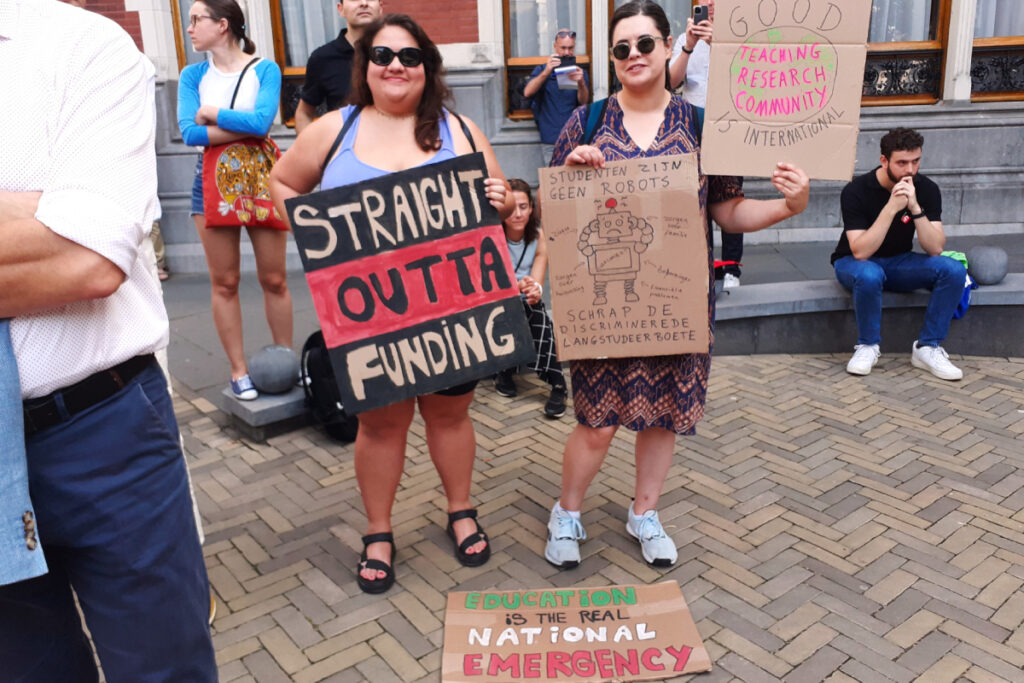Researchers, activists, unions, students, administrators, political parties… They are all worried about the huge cutbacks in higher education and research announced by the government. These amount to about a billion euros.
This Monday morning, they have all come to the ‘Alternative opening’ of the new academic year organised by the General Union of Education. There are stalls with water, coffee, brochures and hats. Next to a small stage, there are large speakers.
Red square
The slow-progress penalty, the cutbacks in research, the curbing of internationalisation… those present think it’s all wrong. In front of the stage, a large red square is rolled out, a worldwide symbol of activism against the problems in science.
The speakers on the stage choose their own phrasing and emphasis. Postdocs, for example, criticise the high workload and the many temporary contracts: the problems will only be aggravated by the cutbacks. An international researcher outlines the advantages of internationalisation.
The Dutch Student Union focuses on the slow-progress penalty for students that take too long to complete their programme. This penalty mainly affects students that are already struggling and turns studying into something for the elite once more, asserts chair Abdelkader Karbache. “No wonder the plan didn’t appear in any election manifesto, because it’s simply too ridiculous to write down.”
Maurice Limmen, president of the Netherlands Association of Universities of Applied Sciences, also sharply criticises the slow-progress penalty. According to him, its mere announcement already inflicts damage. He says he has spoken to first-year students that have now chosen a two-year AD degree programme because they didn’t dare to go for a four-year one due to the penalty.
Mild words
The only one who has a few mild words for the government – alongside fundamental criticism – is Caspar van den Berg, chair of Universities of the Netherlands. He believes the government wants a competitive economy, good healthcare and a resilient society: “Those are all things that cannot do without well-educated young people and scientific research.”
Van den Berg is also a senator for government party VVD and co-wrote the election manifesto. According to him, it concerns “disastrous cutbacks” and he’s even considering legal action, but his own party is co-responsible and at some point he will have to vote on the topic in the Senate.
Isn’t it difficult to say: on the one hand I completely disagree with this, on the other hand I support my party? “No, I don’t think that’s difficult”, he says when asked, “because these are all plans that still need to be fleshed out. There’s nothing in writing yet, no decisions have been made. I will make full use of any currently available space for damage control.”
Pro-Palestinian
On the other side of the spectrum, there is the activist who takes to the stage to speak on behalf of the Pro-Palestinian encampment in Utrecht. Administrators are the ones that set the police on protesting students, which in his view means these administrators are giving in to the wishes of the far right and doing what the government wants: silencing students that are fighting for a better world. According to him, the government uses such clashes between students and the executive boards to win elections.
This is met with strong approval from the activists present. Gaza is definitely not the main focus of this protest against the budget cuts – the administrators don’t mention it, nor do most researchers and union speakers – but someone does hold up a protest sign with the controversial slogan ‘From the river to the sea’.
Strike
As far as the cutbacks go, everyone agrees: they have to be withdrawn. But how to go about this? The universities have already announced legal action against part of the plans, but UvA professor Rens Bod (WOinActie) has a different idea: striking. The idea is received with cheers.
Striking also helped in Scotland, he tells the audience. There, students and teachers sought support from administrators to strike at the end of the academic year, so no students would be able to graduate. The government ended up giving in. This is how it should be done in the Netherlands as well, he believes. As far as he’s concerned, there will be a well-planned strike that wreaks as much havoc as possible. “Strike! Strike!”
Maurice Limmen of the Association of Universities of Applied Sciences listens, but isn’t particularly keen. “I think that’s more of a thing in the world of university education”, he says with a smile. “I’ll leave that up to the colleagues there.”
Engaged
Two foreign teachers of Leiden University are attending the protest carrying large cardboard protest signs. One of them came here four years ago and has a Dutch partner, the other has already been living here for eight years. They work at the humanities faculty as a lecturer and assistant professor, respectively. “I work here, so I also feel engaged with the political developments. If I can’t make my voice heard in the voting booth, I’ll come to gatherings like this one.”
Shining in absence is Minister Eppo Bruins (NSC). He is in Rotterdam, visiting senior secondary vocational school Albeda College, Rotterdam University of Applied Sciences and Erasmus University Rotterdam. Once the protest is over, a few administrators rush off in that direction.
